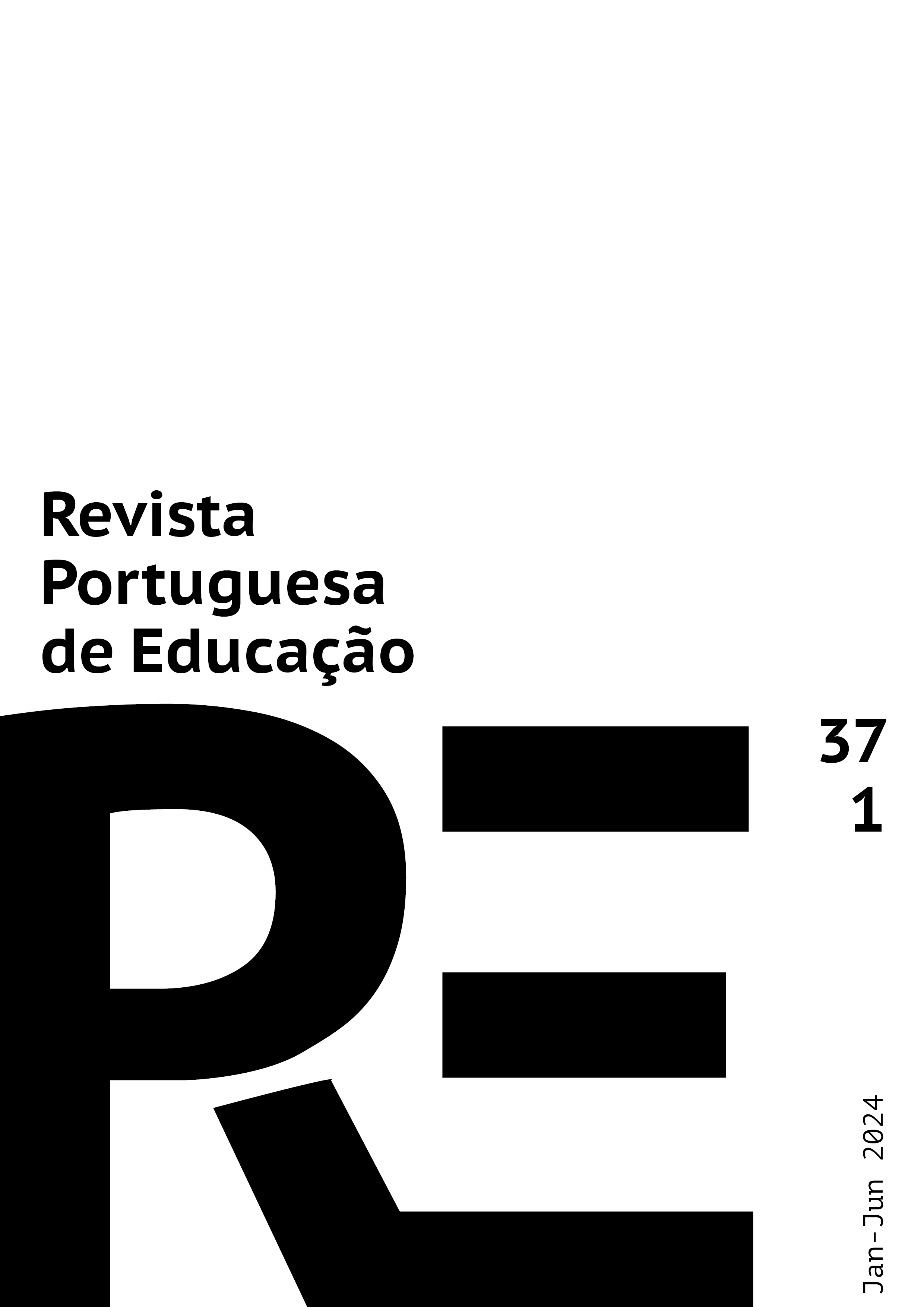Program for classrooms with deaf students: Construction by Chilean and Colombian professionals
DOI:
https://doi.org/10.21814/rpe.26256Keywords:
Deaf, Collaborative Work, Sign Language, Pedagogical ManagementAbstract
Communication and learning are a spontaneous reference within the educational processes of human beings, which include programs for deaf students. The article aims to describe the necessary components of a program for a classroom with deaf students. With a qualitative approach, a phenomenological design, information was collected through discussion groups with the participation and interaction of Chilean and Colombian professionals. There were 44 participants, among them: speech therapists, teachers of deaf, co-educators/linguistic models, Chilean and Colombian sign language interpreters. The results established 3 categories: professional profile, communicative-cognitive strategies and strengthening elements. The conclusions are oriented to the importance of considering articulating elements such as collaborative work and pedagogical management in the development of the professional work of an educational program for a deaf classroom.
Downloads
References
Amayuela Mora, G. (2017). Comunicación y su relación con la educación en el contexto universitario. Alternativas Psicología, (35), 8-19. https://www.alternativas.me/numeros/24-numero-35-agosto-2016-enero-2017/119-comunicacion-y-su-relacion-con-la-educacion-en-el-contexto-universitario
Barra, R., & Muñoz, K. (2020). Importancia del desarrollo cognitivo - lingüístico en estudiantes sordos de educación superior. In K. Muñoz (Ed.), Estudiantes sordos: Desafío para la educación superior (pp. 87-112). Palibrio. https://www.researchgate.net/publication/351752081_IV_IMPORTANCIA_DEL_DESARROLLO_COGNITIVO-LINGUISTICO_EN_ESTUDIANTES_SORDOS_DE_EDUCACION_SUPERIOR_RENE_BARRA_AELOIZA_KARINA_MUNOZ_VILUGRON
Barragán de Anda, A. B., Aguinaga Vázquez, P. D., & Ávila González, C. (2010). El trabajo colaborativo y la inclusión social. Apertura, 2(1), 1-18.https://www.redalyc.org/articulo.oa?id=68820841005
Bastías Urra, M. (2014). Estilos de gestión pedagógica presentes en profesores de escuelas de la Región Metropolitana. Estudios Pedagógicos, 39(2), 7–24. https://doi.org/10.4067/s0718-07052013000200001
Bedoya, M. A., Chanci, F., Santa Cardona, M., & Chaverra , M. (2020). La cultura escolar a partir de las interacciones comunicativas y la interculturalidad. Kénosis: Revista de Ciencias Sociales y Humanas, 8(14). 171-203. https://doi.org/10.47286/23461209.358
Figueroa-Céspedes, I. (2020). La experiencia de aprendizaje mediado en la educación parvularia: Criterios para el enriquecimiento de las interacciones pedagógicas. IEYA: Infancia, Educación y Aprendizaje, 7(1), 107-131. https://doi.org/10.22370/ieya.2021.7.1.1888
Gómez, N. V., Guerra, P., Cruz, J. S., Thomsen, P., Rodríguez, C., & Beas, J. (2012). Díadas Reflexivas Colaborativas: Construyendo nuevos significados sobre aprendizaje y enseñanza. Electronic Journal of Research in Educational Psychology, 10(26), 271-310. https://doi.org/10.25115/ejrep.v10i26.1495
Hernández Sampieri, R., & Mendoza, C. (2018). Metodología de la Investigación: Las rutas cualitativas, cuantitativas y mixtas. Editorial Mc Graw-Hill Interamericana. https://virtual.cuautitlan.unam.mx/rudics/wp-content/uploads/2019/02/RUDICSv9n18p92_95.pdf
Herrera Fernández, V., & de la Paz Calderón, V. (2019). Prácticas pedagógicas y transformaciones sociales. Interculturalidad y bilingüismo en la educación de sordos. Revista Latinoamericana de Educación Inclusiva, 13(1), 73-88. http://dx.doi.org/10.4067/S0718-73782019000100073
Función Pública de Colombia (2005). Ley 982 de 2005. Por la cual se establecen normas tendientes a la equiparación de oportunidades para las personas sordas y sordo-ciegas y se dictan otras disposiciones. 9 de agosto de 2005. D.O. No. 45995. https://www.funcionpublica.gov.co/eva/gestornormativo/norma.php?i=17283
Lissi, M., Svartholm, K., & González, M. (2012). El enfoque bilingüe en la educación de sordos: Sus implicancias para la enseñanza y aprendizaje de la lengua escrita. Estudios Pedagógicos, 38(2), 299-320. http://dx.doi.org/10.4067/S0718-07052012000200019
Ministerio de Educación de Chile. (2021). Orientaciones técnicas para establecimientos con estudiantes sordos. Ministerio de Educación de Chile. https://especial.mineduc.cl/recursos-apoyo-al-aprendizaje/recursos-las-los-docentes/orientaciones-tecnicas-para-establecimientos-con-estudiantes-sordos/
Nikoláesku, I., Budnyk, O., Bondar, V., Tepla, O., & Berezovska, L. (2021). Pedagogical Management in Inclusive Process of the Educational Institution. Amazonia Investiga, 10(39), 76-85. https://doi.org/10.34069/AI/2021.39.03.7
Peters, O. (2002). La educación a distancia en transición: Nuevas tendencias y retos. Universidad de Guadalajara. https://riudg.udg.mx/bitstream/20.500.12104/73591/1/BSUV00011.pdf
Reagan, T., Matlins, P., & Pielick, C. (2021). Deaf Epistemology, Sign Language and the Education of Deaf Children. Educational Studies, 57(1), 37-57. https://doi.org/10.1080/00131946.2021.1878178
Salter, J. M., Swanwick, R. A., & Pearson, S. E. (2017). Collaborative Working Practices in Inclusive Mainstream Deaf Education Settings: Teaching Assistant Perspectives. Deafness & Education International, 19(1), 40-49. https://doi.org/10.1080/14643154.2017.1301693
Strauss, A., & Corbin, J. (2002). Bases de la investigación cualitativa: Técnicas y procedimientos para desarrollar la teoría fundamentada. Universidad de Antioquía.
Urbina, C., Ipinza Villamán, R., & Gutiérrez-Fuentes, L. (2020). Prácticas relacionales profesor-estudiante y participación en el aula: Desafíos para la construcción de una convivencia democrática. Psicoperspectivas 19(3), 1-12. https://dx.doi.org/10.5027/psicoperspectivas-Vol19-Issue3-fulltext-2045
Vallejos, N. R. (2016). El niño sordo en el aula ordinaria. Revista Internacional de Apoyo a la Inclusión, Logopedia, Sociedad y Multiculturalidad, 2(1), 19-32. https://revistaselectronicas.ujaen.es/index.php/riai/article/view/4191
Downloads
Published
How to Cite
Issue
Section
License
Copyright (c) 2024 Karina Muñoz, Carmen Sastre Gonzalez , Carlos Enríquez Lozano, Alejandra Sánchez Bravo

This work is licensed under a Creative Commons Attribution-ShareAlike 4.0 International License.
1. The authors preserve their authorship and grant the Portuguese Journal of Education the right to the first publication. The work is licensed under Creative Commons Attribution License that allows sharing the work with the acknowledgment of initial authorship and publication in this Journal.
2. The authors have the right to take additional contracts separately, for non-exclusive distribution of the published version of their work (e.g. to deposit in an institutional repository or as a book chapter), acknowledging the initial authorship and publication in this Journal.
3. The authors have the permission and are stimulated to post their work online (e.g. in an institutional repository or on their personal website). They can do this at any phase of the editorial process, as it may generate productive changes, as well as increase impact and article citation (see The Open Citation Project).
The work is licensed under Attribution-ShareAlike 4.0 International (CC BY-SA 4.0)




















